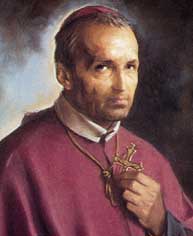
St. Alphonsus Liguori
Born: September 27, 1696
Died: August 1, 1787
Feast day: August 1
Patron saint of: people with arthritis, lawyers, vocations
Alphonsus Liguori was not a favorite with the windbags of his day. A star preacher, he called his fellow sermonizers on the carpet for sermons of “empty, rumbling rhetoric” or “flashy display” without substance. “Remove all the fancy words from your sermon,” he thundered. “Do not say ‘dwelling’ but ‘house,’ nor ‘spine’ but ‘back,’ not ‘enable’ but ‘help.’” (Hear those cheers coming from the pews?) Liguori said that while he might have to account to God for many sorts of sins, improper preaching was not among them, “for I always have preached in a way that everyone could understand me.”
Alphonsus Liguori made it his life’s work to bring the basics of the faith to everyone, no matter how dismal their education. He founded the Redemptorist order, whose primary purpose was “to bring the Good News to the poor.”
In his writing as in his sermons, Liguori preferred plain and simple to pomp and circumstance. Tired of seeing his colleagues publish ponderous tomes that no one read, Alphonsus began publishing a series of slim volumes, each on a single topic, in plain language for everyday people. He turned out 111 books in his lifetime, many of which were still being reprinted more than 100 years later.
His printers dreaded to see him coming, for he pestered them about the printing and distribution of his books, and he pored over his reviews in the paper. Of his Great Means of Prayer he said, “I would like to have printed enough copies so that every Christian in the world might have one.”
The millions who read his books found a message surprisingly liberating for its day. Although Liguori himself had abandoned a promising legal career to become a priest, he insisted that laypeople’s path to holiness lay in their everyday lives, not in running off to a monastery or desert hermitage. “God wishes all to become saints . . . the priest as priest, the married person as married person, the merchant as merchant, and the very same for every walk of life.”
He pounded home another familiar message: God’s boundless love for each person. He took pains to let the most uneducated and crude people of his society know that God loved them without end. The natural response to this love is love of God in return, said Liguori, which is lived out by accepting God’s will.
Liguori’s tactics flew in the face of many moralists of his day, who used fear to goad people into holiness. “Fear is not an emotion that endures for long,” he wrote. “It is better to stress Christ’s love for us and the love we owe him.”
In Moral Theology, he scandalized many Catholics by arguing against the rigorous morality of the day: “Considering the fragility of the human condition, it is not always true that the safest way to direct souls is through the narrowest path.” Liguori was one of the first to argue that procreation was not the sole end of marriage, contradicting the theology of Augustine which had held sway for centuries.
In fact, just about the only people Liguori was truly tough on were his own fellow Redemptorists, whom he expected to blaze new trails of holiness for future generations. (One person suggested that when contemplating death, Redemptorists are more afraid of meeting Liguori than they are of meeting God.)
Alphonsus Liguori died at the age of 90 and was named a saint in 1839.
Originally published in the February 1992 issue of Salt magazine, ©Claretian Publications.
Image: via Wikimedia Commons






